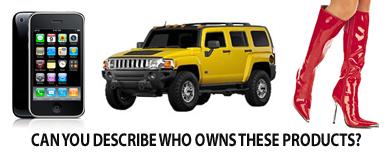 I’m currently reading a new marketing textbook that was just released called, “Consumer Behavior: Human Pursuit of Happiness in the World of Goods,” written in collaboration with Professor Banwari Mittal and six of his colleagues. If truth must be known, Professor Mittal mentioned me in his book and was kind enough to send me a copy upon its release. The book is a treasure trove of consumer behavior data, opinion and observation. Being a textbook, I bounce from one section to another in no particular order. What inspired this article was in the chapter on consumer motivation. The example in particular was a group of people who were asked to describe someone who might buy Maxwell House Instant Coffee. The majority were quick to judge that the consumer of instant coffee was a lazy person. This opinion begged the question – “What caused the person to view the purchaser of the instant coffee so disparagingly?” especially when they didn’t even know the person. Could it be that the people were actually transferring their own inadequacies to the instant coffee purchaser? A guilty pleasure so to speak.
I’m currently reading a new marketing textbook that was just released called, “Consumer Behavior: Human Pursuit of Happiness in the World of Goods,” written in collaboration with Professor Banwari Mittal and six of his colleagues. If truth must be known, Professor Mittal mentioned me in his book and was kind enough to send me a copy upon its release. The book is a treasure trove of consumer behavior data, opinion and observation. Being a textbook, I bounce from one section to another in no particular order. What inspired this article was in the chapter on consumer motivation. The example in particular was a group of people who were asked to describe someone who might buy Maxwell House Instant Coffee. The majority were quick to judge that the consumer of instant coffee was a lazy person. This opinion begged the question – “What caused the person to view the purchaser of the instant coffee so disparagingly?” especially when they didn’t even know the person. Could it be that the people were actually transferring their own inadequacies to the instant coffee purchaser? A guilty pleasure so to speak.
If presented with the three products presented here, how would you describe the owners? On what basis was your opinion formed? What inner secrets do we harbor and project on our observations of others? What brand personalities do we embrace when we make purchasing decisions based on these inner secrets? Even in the preparation of this article and choosing the three products, I had my own impression of the owners and what may have motivated their purchases, good or bad.
What pros and cons do your potential customers consider when they choose to engage you or walk? It should be the goal of every one of us to address the negatives and accentuate the positives of our own brands. It is also important not ignore any baggage such as societal stigma or popular assumptions in the promotion of our brand. To do so would be fool hardy.
Drawing conclusions on people we don’t know is a reflection on a perceived image. That image dictates how we interact with that individual or brand. Making the wrong decisions is where we lose money. If you’re making a profit then you’re making more right decisions. The trick is to stay on top of your brand and how it is viewed and reacted to.
On the web I see some consultants adjusting to prejudices that dictate they might be considered “too slick.” They address these issues by purposely creating “amateur” videos and promotional materials. Viewing these presentations might motivate your interest with their “just like me” attitude. To others it smacks of unprofessionalism. Neither are wrong of course, but have everything to do with the motivation of their target customer.
What is your brand saying?
Great post! I will have to look into buying this textbook!
It is a landslide of information. Thanks for the comment Pat.
Congrats on getting mentioned in Professor Mittal’s textbook. It sounds like a very interesting read.
You make a good point about how people automatically judge people based on products they use. I would think this would be quite difficult to overcome. Changing the way people think is a challenge.
I agree laptop. It’s definitely a perception/reality dilemma. Maybe some of our readers here have some ideas as to how to address this situation.
Wow, it’s great that you were mentioned in his book. I definitely agree that certain products and brands tend to say something about the people who use them. When I see someone driving a Bentley, for example, that tells me more about that person than when I see someone driving a Toyota. In some cases, though, our assumptions can be incorrect, especially as brand imaging and consumer preferences shift over time. -Josh
I think this would be a great project for some research people to see how close people’s perspective is on percieved owners and actual owners. I wonder how close the data would be?
I definitely agree that certain products and brands tend to say something about the people who use them.
Those ‘certain products’ have a tendency to be lifestyle products – would you agree?
To get ur product identified with a niche is always difficult and its becoming more and mre difficult with advent of web. Brands are increasing but brands that identify a niche
coca cola – soft drink
mcdonalds – quick food
are diminishing.. A world of medocrity is coming soon
I don’t know Pack, but I think that niches are actually growing due to social networking and other web vehicles where people are segmented into interest groups. Amazon and iTunes break their audience into interest niches by what genre of music they listen to and the types of books they read. So, this capability only catapults niche building.